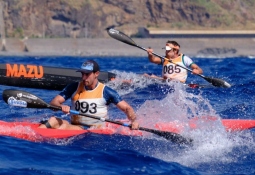Titus Murithi cut a lonely figure on the Tana River near his village of Sagana in Kenya’s heartland four years ago.
At the time he was his country’s only canoe slalom paddler. His friends all thought he’d gone crazy, rolling around on the river in his battered old kayak.
“I was just by myself,” Murithi said.
“I just used to train by myself. I had no-one to tell me what to do, but I was so passionate about it. I thought if this is what I was going to do, I really needed to push myself.”
He’d always liked the water, and had done some flatwater paddling. But slalom was completely foreign to him.
“I never knew canoe slalom even existed, and nor did the Kenyan Association,” he said.
“The ICF brought in some slalom coaches, and that’s where my interest started. Soon I was competing in bigger competitions in Brazil, in Australia, in the Czech Republic.
“I thought ‘wow, this could be a very good sport’.”
The people from his village don’t think he’s crazy any more. Not only has Murithi travelled the world representing Kenya in canoe slalom, he is also turning a bunch of Kenyan teenagers into potential Olympians.
BARCELONA
This week he is in Barcelona as coach of the Kenyan Youth Olympic qualification team. He has two starters – pint-sized 15-year-olds Levis Karanja and Billy Ngere. Both paddlers have only been in the sport for two months.
For both boys it’s the first time they’ve been outside Kenya. They’d never been on an aeroplane, never even been to the Kenyan capital, Nairobi, so to suddenly lob in Barcelona was an eye-opening experience.
“One of them was a bit nervous, he could not even eat,” Murithi said.
“I was a bit worried. They had never even been to Nairobi, and now they are in Barcelona.
“The first day here they didn’t even understand if this was a reality, or they were dreaming. But now they are just embracing whatever is happening, and they are so excited.
“When they go back, I believe the story that they are going to share with other schoolmates, this will go all around the village and everyone will be very excited.”
From one paddler four years ago, there are now around 20 teenagers aged between 12 and 17, and another 15 older paddlers all doing crazy stuff on the Tana River.
It’s an incredible success story for Kenya, and for the ICF and its development program, which is working to introduce new athletes and new countries all around the world to different canoe disciplines.
Murithi has no doubt the young Kenyans competing in Barcelona this week will inspire many more to try their hand at slalom. The trick will be to keep the sport growing in a country where its most successful athletes tend to spend most of their time on dry land.
“We have to make sure by the time these kids finish school, this sport has grown,” he said.
“There is a big potential for Kenya when it comes to whitewater. We have access to the most important facility, which is the water, and because of that I see a lot of potential.
“The Tana River is the longest river in Kenya, it has some rapids and is a really fantastic place to train. It is near our village, so it makes it easier to train and keeps pushing us all the time.
“In Kenya winning medals is very important, and I think we have the potential in canoeing to bring home some medals.”
OLYMPICS
Titus Murithi’s days as a top-level competitor are over. He’s had a career he’s very proud of, competing in international competitions all around the world.
His major goal of competing at an Olympics eluded him. He’s determined to make sure the young athletes he’s now in charge of will get to experience what he couldn’t.
“I was hoping to go to the Olympics, but I never made it,” he said.
“I’m looking though for the young boys now, as a coach. That is my main goal is to make sure these boys, our young generation, have a good platform to get to the Olympics.”
That is a long way down the track. For now Titus Murithi is just focussed on making sure he gets two wide-eyed 15-year-olds safely through to the end of this week. If one of them can get to Buenos Aires later this year, it will be an absolute bonus.
“For them, to be here is a big achievement,” he said.
“They were a bit worried about it, so even for them to come here to Barcelona it’s a big achievement.
“In the back of my mind I am not pushing them to be number one, but I want to see them competing. The challenge will be, whatever position they come, to open up their mind in terms of when they go back, they will have to pull up their socks, be more aggressive, because they will have seen other people doing it.”
Murithi has another dream. He hopes that one day Kenya will become self-sufficient in canoe slalom, running their own training programs, even building their own canoes.
“It is not a very popular sport in Kenya, especially the kind we are doing for the Youth Olympics,” Muriithi said.
“What we are using now is what we got from the ICF five years ago. We are using plastic boats, that is one of the major challenges that we are having. We are not able to manage to make our own boats, so we are having to get them from overseas.
“But maybe we are looking at one day, when we have a big team, we will be able to develop a program where we can manufacture our own boats in Kenya.”
The ICF Canoe Youth Olympic Games qualifiers begin in Barcelona on Thursday.

